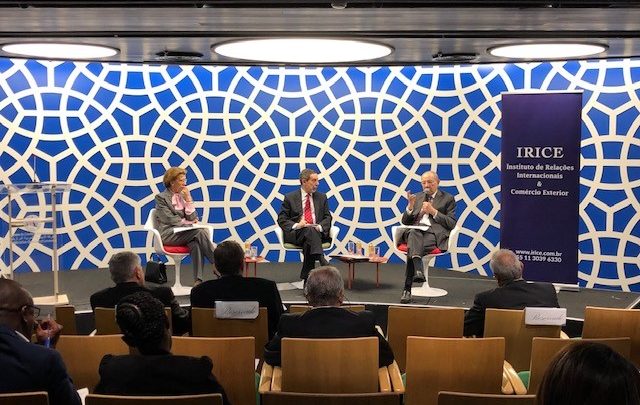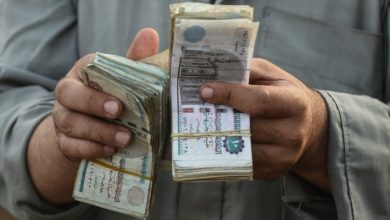
São Paulo – Brazil’s International Relations and Foreign Trade Institute (Instituto de Relações Internacionais e Comércio Exterior – Irice) hosted an event this Tuesday (4) to discuss foreign policy challenges facing the incoming administration. The panels were held at the Arab Chamber Space, in the offices of the Arab Brazilian Chamber of Commerce on São Paulo’s Avenida Paulista.
Panels included “Domestic scenario and external perception,” “Finding a place for Brazil in the world to matchits status as one of the ten biggest economies in the world,” and “The struggle for hegemony between United States and China in the 21st century.” Panelists included ambassador and Irice chairman Rubens Barbosa; ambassador and Arab Chamber International Relations vice president Osmar Chohfi; USP International Conjuncture Analysis Group (Gacint) coordinator Alberto Pfeifer; the coordinator of the Center for International Trade and Investment Studies (CCGI) of the São Paulo School of Economics at Fundação Getúlio Vargas (EESP-FGV), Vera Thorstensen; economist Roberto Luis Troster; and Fabiana D’Atri, economist and coordinator of bank Bradesco’s Department of Economic Research and Studies. In the audience were the ambassador of Bolivia to Brazil, José Kinn Franco; Arab Chamber interim CEO Tamer Mansour; and a delegation from the Arab-Mozambican Chamber. Pictured above from left to right are Thorstensen, Chohfi and Barbosa.
Barbosa, a former ambassador of Brazil in Washington, the new administration needs social security and tax reforms in order to narrow the credibility gap facing Brazil on a global level. He also said foreign policy grew “less partisan” during the Temer administration, and that “economic distortions” were addressed in the last two years.
“Out there they are waiting to see what will happen in here,” the ambassador said. According to him, it’s unheard-of for an openly right-wing, economically liberal politician to be elected president in Brazil. “This agenda of social conservatism is not exclusive to Brazil. It’s a global movement that’s growing stronger in the United States, Germany, Italy and Poland,” for instance, he said, referencing Brazil’s president-elect Jair Bolsonaro.
Barbosa said the new administration will be inaugurated amid a turbulent, unpredictable international scenario, as globalization comes “under attack.” He believes the government must work to get Brazil to its rightful place as one of the ten biggest economies in the world.
“The job of Brazil’s Foreign Ministry and government as of January 1st is twofold. Firstly, they must reinsert Brazil into the dynamic flow of economics and international trade. Secondly, they must strengthen Brazil’s voice in the international scenario, in international organizations, while always looking out for Brazil’s best interests,” the diplomat said. He explained that in order to do so, the administration needs to prioritize and decide on what it expects from its relations with the United States, the European Union, China, the Mercosur and particularly the BRICS.
Regarding the moving of Brazil’s Embassy in Israel, Barbosa said it is time for caution. “I have been refusing to discuss things that were said during and after campaign, both by the president-elect, his son (Eduardo) and the vice president (Mourão). I’m yet to hear the Foreign Minister (Ernesto Araújo) speak, so I’d rather wait. After all, he will be the leader of Brazilian diplomacy. It’s one thing for you to blog about globalism, the environment or Trump as your personal opinion. It’s something else to translate those generalist notions into actual acts of foreign policy. The principle is one thing, the practice is another,” he said.
Scenario
Pfeifer gave an overview of Brazil’s political scenario since the impeachment of president Dilma Rousseff, in 2016, until now, with Bolsonaro as the president-elect. He commented on “Bolsonaro’s new style of communication,” i.e. on social media, and the renewal of politicians in the two Legislative Houses – the Chamber of Deputies and the Senate. He said the [Legislative, Judicial and Executive] Powers must be respected; that the “president-elect is of the anti-globalist neo-pentecostalist style;” and mentioned the fact that several military officials have been named for ministries. He went on to say that minister of Economy-to-be Paulo Guedes might interfere with Brazilian foreign relations, and discussed Bolsonaro’s alignment with the United States and its president Donald Trump.
Translated by Gabriel Pomerancblum
News from https://anba.com.br/en/event-covered-brazilian-foreign-policy/





